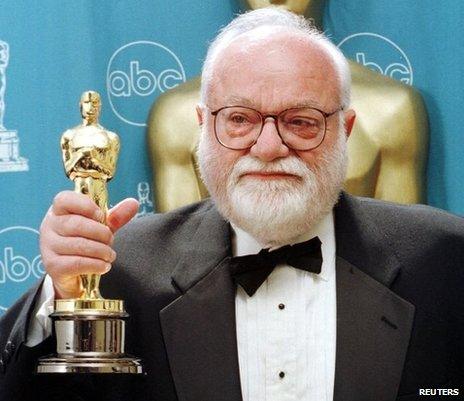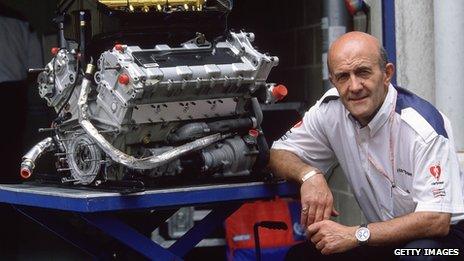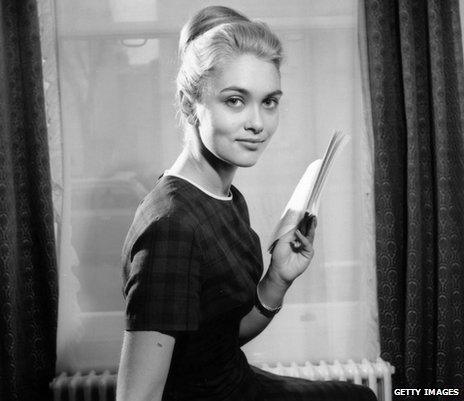Been and Gone: The man who made Senna's engine and a master watchmaker
- Published

Our regular column covering the passing of significant - but lesser reported - people of the past month.
Academy Award winning film producer and record company boss Saul Zaentz, external spent a great deal of his life in various stages of litigation. After buying Fantasy records in 1967, he helped the band Creedence Clearwater Revival launch their first album. But the relationship soon soured after Zaentz was successfully sued by the band when his bad investments cost them millions of dollars. He was then involved in a long-running legal battle with the band's frontman John Fogerty over accusations of plagiarism. Meanwhile, Zaentz had become a film producer, winning Oscars for Amadeus, One Flew Over the Cuckoo's Nest and The English Patient. But after buying the film rights to The Hobbit and The Lord of the Rings he was again in a legal dispute, this time with the director Peter Jackson. Not content with this, his company also began threatening legal action against small English businesses that had been using the word Hobbit in their names for decades.

Zaentz, pictured in 1997, with his Oscar for best picture for The English Patient
Alicia Rhett, external was a reluctant performer who was the oldest surviving credited member of the cast of the Hollywood blockbuster Gone With the Wind. Born in 1915, she was working as a stage actress in Charleston, South Carolina, when she was spotted by the director, George Cukor, who was looking for an actress to play Scarlett O'Hara. She auditioned for the role of Melanie Hamilton, which eventually went to Olivia de Havilland, before being offered the part of India Wilkes, sister to Ashley, Rhett Butler's rival for Scarlett's affections. A talented artist, she whiled away time on set by painting portraits of other cast members. Her acting career was short-lived and two years after the film was released she announced her retirement. She became a voice coach and radio announcer but continued to paint portraits. One of her subjects was the 19 year old Alexandra Braid who, as Alexandra Ripley, would later write Scarlett, the sequel to Gone With the Wind.
Legendary Formula 1 driver Ayrton Senna owed his first success to the British engineer Brian Hart, external. It was Hart who developed the engines for the Toleman F1 team in 1984 which saw the Brazilian on the podium for the first time in his career. Hart understood what was needed to win having begun as a driver himself. From early days in sports cars, the pinnacle of his career came when he qualified for the 1967 German Grand Prix. He gave up racing to concentrate on engineering, and formed a successful partnership with Ford, producing the engines that gave the company success in rallying and Formula 2. His collaboration with the Toleman team brought them the European F2 Championship in 1980. After Benneton bought Toleman, Hart developed a V10 engine and supplied Eddie Jordan's eponymous F1 team. He left the company when it was bought out by the racing entrepreneur Tom Walkinshaw.

Eric Lawson was just one of the men who featured as the Marlboro Man in a series of advertisements for the cigarette brand. The image of the steel-jawed cowboy, eyes squinting against the sun, and also against the rising smoke of the cigarette in his lips, became one of the most iconic symbols in 20th Century advertising. The figure first appeared in 1954 to give a macho edge to the idea of smoking filter-tipped cigarettes which were considered feminine at the time. Indeed, the original Marlboro adverts had the slogan: "As Mild as May." The new campaign was successful almost immediately, eventually quadrupling sales and introducing the concept of the rugged Marlboro Country. Lawson was a bit-part actor who had been smoking since the age of 14. He later appeared in an anti-smoking advert, parodying the Marlboro campaign. Along with three other "Marlboro Men" he contracted lung disease which eventually killed him.
Alexandra Bastedo, external sprang to fame in the television series The Champions. It was based on the unlikely premise that three people had developed powers of ESP, precognition and massive physical ability which they used to fight evil organisations in exotic locations. The series lasted less than two years but it established Bastedo as one of the great sex symbols of the 1960s. Her fluency in five languages saw her work as a translator at No 10 Downing Street and landed her a job co-presenting Miss World. She later appeared in an episode of Absolutely Fabulous, and landed the part of Cynthia Marshall in EastEnders in 2008. This was much to the delight of tabloid editors who had an excuse to pull out her 1960s glamour shots. Her acting career lasted more than 40 years, mainly bit parts, but her real passion was for animals. She founded the Alexandra Bastedo Champions Animal Sanctuary and was patron of a number of animal welfare organisations.

The arrival of quartz watches in the 1960s threatened the dominance of the old Swiss watch-making industry. Raymond Weil, who had been designing watches for other companies, took the decision to fight back. The new technology made watches more reliable and cheaper to produce which threatened to undermine the Swiss who had stuck with mechanical movements. By the time he launched his new range the number of traditional watch makers in Switzerland had fallen by two thirds. While some in the Swiss watch industry collaborated on the downmarket Swatch, Weil decided that he could put quartz movements into a luxury brand, relying on good design and appropriate advertising to take his products upmarket. To enhance the quality image he adopted names from classical music for his ranges such as Amadeus and Traviata which appealed to his well-heeled customers. By the time he retired in 2002, Raymond Weil had become a global luxury brand.
Among others who died in January were:
Pete Seeger, folk singer and political activist
Claudio Abbado, conductor and mentor of many young musicians
Christopher Chataway, athlete, broadcaster and MP
Roger Lloyd-Pack, Only Fools and Horses actor
Ariel Sharon, Israeli politician and former general
Run Run Shaw, Hong Kong media tycoon
Eusebio, legendary Portuguese footballer
Phil Everly, rock musician
Elizabeth Jane Howard, novelist
Follow @BBCNewsMagazine, external on Twitter and on Facebook, external